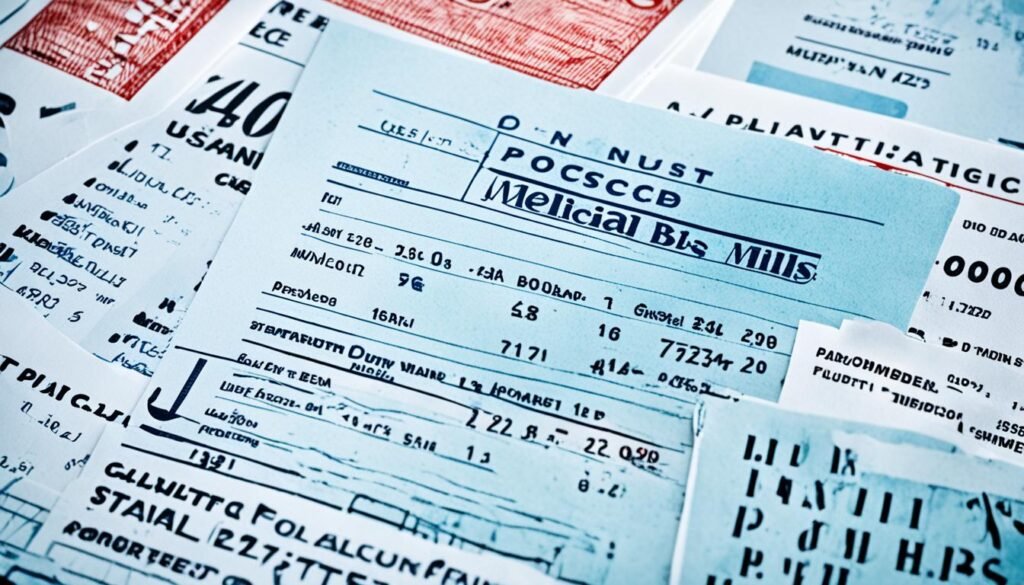Health insurances is key for your health and money safety. It helps pay for vital health services, saving you from huge medical bills. If you’re not covered, you might have to pay all costs, which could hurt your finances. Plus, with insurance, you’re more likely to get regular checkups. This means doctors can spot any health issues early, keeping you healthier.
If you don’t have health insurance, you might face tax penalties under the Affordable Care Act (ACA). But beyond that, having insurance is a smart choice. It gives you access to good healthcare, guards you from sudden bills, and helps you stay calm. With insurance, you’re ready for any health challenges life brings.
Key Takeaways
- Health insurance provides essential coverage for medical expenses and financial protection
- It encourages preventive care, which can help identify health issues early
- The Affordable Care Act requires most people to have qualifying health coverage
- Health insurance is an important investment for your overall well-being and financial security
- It offers access to quality healthcare and protects against unexpected medical costs
The Importance of Health Insurance Coverage
Health insurance is a key part of good healthcare. It helps many people by spreading out the cost of big medical bills. This way, you and your family can get medical help without worries about money.
Objectives of Health Insurance
Health insurance has several important jobs:
- Promoting Health and Wellness: It makes people focus on preventing sickness and getting help early. This leads to better health for everyone.
- Ensuring Access to Healthcare: It lets people afford the medical care they need, even if they can’t pay all at once.
- Financial Protection: Health insurance stops you from having to pay all the money for treatment by yourself. It helps with both sudden and long-term health problems.
- Employer-Sponsored Benefits: Many jobs give health insurance to keep their employees happy and healthy. This helps keep the workplace strong.
- Government-Sponsored Programs: Countries also help, making sure everyone can get insurance, especially those who might not get any otherwise, like the elderly or the disabled.
The main goal of health insurance is to make sure everyone can be healthy and not worry about the cost of care.
“Health insurance is not just about paying medical bills – it’s about peace of mind, financial security, and the ability to focus on getting well without the worry of how to afford treatment.” – Dr. Jane Doe, Healthcare Policy Expert
Also Read :How To Get The Best Auto Loan
Myths and Realities About the Uninsured
Some people think the uninsured population in America can easily get needed care. But in truth, those without insurance often avoid necessary care. They tend to miss out on preventive services and don’t regularly manage chronic diseases. This neglect can lead to costly and severe health problems if not treated early.
Contrary to popular belief, the uninsured are not mostly young and healthy. Nearly half of those surveyed believe the uninsured are more likely to have health problems than those with insurance.
The Reality of Being Uninsured
The uninsured have big hurdles in getting healthcare. They often:
- Delay or forgo necessary medical care
- Miss out on regular primary care and preventive services
- Find it hard to manage their chronic conditions
- Experience financial stress from sudden medical bills
Not addressing their health issues can breed serious outcomes. This includes more severe health problems, lower life quality, and sometimes, early death.
Also Read :How Do I Find The Best Insurance Policy For Me?
Busting the Myth of the “Healthy Uninsured”
The idea that the uninsured are mainly young and fit is a myth. The reality shows that a nearly half of the uninsured population has a chronic disease. These ailments range from diabetes to mental illnesses. Without routine check-ups and care, their conditions can worsen, leading to more hospital visits and greater health expenses.
This situation amplifies personal and systemic healthcare costs. It underlines the need for regular health management among the uninsured.
“The uninsured are not just the young and healthy – they are also individuals with significant healthcare needs that go unmet, leading to poorer health outcomes and higher costs down the line.”
| Myth | Reality |
|---|---|
| The uninsured can still get the care they need. | The uninsured are much less likely to receive necessary care, preventive services, and regular management of chronic conditions. |
| The uninsured are mostly young and healthy. | Nearly half of the uninsured population has at least one chronic health condition that requires ongoing care. |
By clearing these common misconceptions, we gain a better understanding of the uninsured population’s real struggles. This insight is key to improving their healthcare access, preventive services, and chronic disease management.
Also Read : How Does Pet Insurance Work?
Health Insurances: A Safety Net for Medical Expenses

Health insurance is key for covering medical costs. It keeps individuals and families safe when health emergencies hit. Without it, the price of basic care could be too much to bear. Health plans lessen the costs, which is a big help.
Protecting Against Unexpected Costs
Even if you’re usually healthy, it’s wise to have a health plan. With high-deductible plans and HSAs, you’re protected against big medical bills. This ensures you can handle medical expenses without falling into debt.
A recent study found that being uninsured can lead to massive bills. An uninsured person might face costs over $20,000, risking bankruptcy. Health insurance, despite having high deductibles, shields us from such medical expenses.
| Health Insurance Plan | Average Annual Premium | Average Deductible | Tax-Advantaged HSA Eligibility |
|---|---|---|---|
| High-Deductible Health Plan | $4,500 | $1,500 | Yes |
| Employer-Sponsored Plan | $7,000 | $1,000 | No |
Having health insurance gives a sense of security. It ensures we’re not alone in facing large medical costs. This support lets us concentrate on staying healthy, not on how to pay for care.
“Health insurance is essential, not a luxury. It shields us from the ruin of sudden medical bills.”
Also Read : What Is An Installment Loan?
Preventive Care and Health Maintenance

Staying healthy is a journey that lasts a lifetime. Health insurance is key to this path. It supports us by nudging us to have regular check-ups, get screenings, and take necessary shots. This helps spot potential issues early, saving us from bigger problems and costs later on.
Most health plans fully cover certain preventive services when in-network, making them easy and cheap to get. This makes managing chronic health problems easier and boosts our overall health. Such steps are not just good for us as individuals but also help societies at large save on healthcare costs later.
Health insurance does a lot to help us stay healthy. It makes important care easier to get and affordable. This leads to finding diseases early, managing them better, and enjoying better health. Such measures ease the financial load on our healthcare system over time.
- Regular preventive care check-ups help identify potential health issues early
- Many health plans cover 100% of the cost for in-network routine check-ups and screenings
- Preventive care enables better management of chronic conditions and overall health
- Health insurance plays a crucial role in encouraging and facilitating preventive care
“Preventive care is the foundation of a healthy society. By making it accessible and affordable, health insurance empowers individuals to take charge of their well-being.”
Also Read :What Is A Loan Disbursement?
Access to Quality Care and Provider Networks

Getting good healthcare is crucial. Health insurance plans are key in getting people to top providers and hospitals. They create a group of healthcare spots and professionals who participate, known as an in-network provider network.
Choosing In-Network Providers
In-network providers offer savings. They have deals with the insurance, so they charge less. This means you pay less too, in costs like deductibles or copays.
Sticking with in-network healthcare provider networks also means better quality of care. Insurers pick providers that do their job well and make patients happy. This aims to give policyholders high-quality care and avoid bad or less effective treatments.
It’s wise to check the in-network providers when picking a health insurance. See if they have what you need, close by, and with good reputations. This includes looking at the type of specialists they offer.
| In-Network Providers | Out-of-Network Providers |
|---|---|
| Contracted with the insurance plan, offering cost-savings and quality of care | Not part of the insurance plan’s network, often resulting in higher out-of-pocket expenses |
| Adhere to the insurance plan’s standards and provide high-quality care | May not meet the insurance plan’s quality standards or have higher costs |
| Offer lower deductibles, copays, and coinsurance for policyholders | May require policyholders to pay a larger portion of the costs |
Picking a health insurance with a strong in-network provider network is smart. It helps with bills and guarantees top high-quality care.
Also Read :How Do I Get A Loan Without Credit?
Health Insurance for All Life Stages

Health insurance is very important throughout life. It’s from childhood to old age. People working might get it from their jobs. But, others can use individual plans or programs like Medicaid and Medicare. These help even if you can’t get insurance through work. It’s important as it covers the health needs of families, not just individuals.
It’s key for everyone, no matter the age or if you work. Health insurance keeps you healthy and safe financially. Now, let’s see what kinds of health insurance are out there for different life stages:
Health Insurance for Children and Dependents
Children can be on their parents’ work insurance or state programs such as Medicaid or CHIP. These options make sure kids get the checkups and care they need. This helps them stay healthy and grow well.
Health Insurance for Working-Age Adults
For adults working, job health plans are usually the go-to. Employers might give options for just you or your whole family. Yet, don’t worry if you don’t have this at work. You can still find plans by yourself or through the ACA marketplaces.
Health Insurance for Seniors
Once you’re retired, Medicare is there. It covers hospital stays, doctor visits, and meds. Plus, seniors might add extra plans like Medigap to help even more.
It’s never too early to think about health insurance. The right plan offers safety, good care, and peace. By knowing about the different options, you can choose what’s best for you and your family. This helps for your long-term health and happiness.
Consequences of Being Uninsured
Being uninsured can have big effects on health and money. People without insurance find it hard to get quality healthcare. They often skip needed medical care because it’s too expensive.
If you don’t have health insurance, the money you may owe for medical care can be a lot. This can even lead to bankruptcy. Those without coverage might not get check-ups, tests, and medicines they need. This can hurt their health in the long run.
The Affordable Care Act (ACA) aimed to help the uninsured by making health insurance more affordable. But many people still don’t have insurance. So, they keep facing these problems.
Reduced Access to Care
People without health insurance might not get preventive care and may skip needed treatment. This can make small health issues become big problems because they weren’t treated early.
- The uninsured often delay getting medical help. This can make their health problems worse over time.
- People without coverage might not be able to see the right doctors. They could also find it hard to pay for special or ongoing care.
Financial Hardship and Bankruptcy
For the uninsured, the cost of medical care can hit them hard financially. A big medical issue without insurance can lead to bankruptcy. It can use up all their savings, making it tough to pay their bills.
| Insured Population | Uninsured Population |
|---|---|
| Less likely to face financial barriers to accessing care | More likely to delay or forgo necessary medical treatment due to cost concerns |
| Protected from the full cost of unexpected medical expenses | Vulnerable to the financial burden of high medical bills |
| Lower risk of bankruptcy or other financial hardship | Higher risk of bankruptcy or other financial hardship due to medical expenses |
Not having insurance can deeply affect health and money. It is key to ensure everyone can get needed healthcare. Tackling the problem of the uninsured is very important for fair and accessible healthcare.
Health Insurances: An Essential Investment

Health insurance does more than protect against medical bills. It’s a key investment in your health and financial safety. It also boosts your community’s health and stability.
It guards you from high medical costs and helps pay for check-ups. So, you’re more likely to spot health issues early.
This leads to better health for you and less strain on the healthcare system. Less people face struggles from being uninsured, like poor health choices and money problems. They also get better healthcare access.
Not having health insurance has huge effects, personally and for society. That’s why it’s truly essential for everyone. It shields you and supports your community’s health and stability.
“Health insurance is not just a luxury – it’s a necessity for maintaining good health and financial security. It’s an investment in your future and the future of your community.”
| Benefits of Health Insurance | Impact on Individual and Society |
|---|---|
|
|
Health insurance is vital for your well-being. It’s a must for your health and financial future. By having it, you ensure you and your community can access essential care. This strengthens everyone’s health and society.
Also Read : Discover Subsidized Loans Affordable Financing Options
Conclusion
Health insurance is key to keeping us safe and sound, both physically and financially. It pays for doctor visits, supports check-ups, and guarantees you see the best healthcare pros. Not having it means risking your health, endless bills, and not getting the right care.
Seeing health insurance as crucial to your well-being is smart. It secures your future and helps make our communities healthier. No matter your job or health, having health insurance is vital for your long-term health and wealth.
Health insurance is very, very important. It protects you and your wallet. It helps you get check-ups and ensures you get good care when needed. Choosing to get health insurance is a big step towards staying healthy and financially secure, while also helping your neighborhood stay well.
FAQs
Why Do I Need Health Insurances?
Health insurance is important for your health and money safety. It helps pay for important medical needs. Without it, you might have to pay all medical bills. This could hurt you financially. Health insurance also makes you more likely to get check-ups. This way, health problems can be found early, before they get bad.
What are the Objectives of Health Insurance?
Health insurance has many goals. It helps keep people healthy and gets them the care they need. It also protects our money from big medical bills. By joining many people together, everyone can avoid paying huge costs on their own. Health insurance lets us save money to use for regular and important health checks.
What are the Myths and Realities About the Uninsured?
Some think people without insurance can still get care. But, the truth is, they often don’t get the care they need or deserve. They are less likely to see a doctor regularly or get preventive help. This can make their health problems worse and more expensive to fix. Many believe the uninsured are young and healthy. But the fact is, most of them have health problems.
How Does Health Insurances Provide a Safety Net for Medical Expenses?
Health insurance is like a safety net for our health costs. It helps us avoid huge bills for surgeries or check-ups. Even with regular doctor visits, the price can be too much without insurance. Health insurance shares the cost, making it easier for us to pay. For people who don’t get sick often, there are plans with lower monthly payments. These plans can still protect us from very high costs if something big happens.
How Does Health Insurance Encourage Preventive Care?
Having health insurance pushes us to take care of ourselves before we get sick. It covers regular check-ups and shots. This way, any health problems can be found and fixed early. Many plans pay for these visits completely, making them easy to do. Staying ahead with our health keeps us from getting really sick and can make us feel better overall.
How Does Health Insurance Ensure Access to Quality Care?
Health insurance lets us go to a group of doctors and hospitals that work with them. These places offer care at a lower price if we are covered by the insurance’s plan. This means we can save money when we go to the doctor. Also, insurance companies make sure these places give good care by checking on them regularly.
How Important is Health Insurance at Different Life Stages?
Health insurance matters no matter our age. We get it through our job when we work. But there are other ways to get it if we don’t have a job that offers it. For example, there are programs like Medicaid for those who need help and Medicare for older people. Insurance can also cover our family, like our kids or partners, keeping us all safe and healthy.
What are the Consequences of Being Uninsured?
Being without insurance can hurt our health and money. People without insurance often skip check-ups and don’t get needed care. This can make health problems worse and more expensive to treat. And paying for healthcare without insurance is very expensive. It could cause financial problems or even bankruptcy.
Why is Health Insurance an Essential Investment?
Health insurance is key to our health and financial safety. It protects us from expensive medical bills. It encourages us to take care of our health early. This is good for us and for the healthcare system. With insurance, we can all get better care and make our society healthier.
Source Links
- https://www.cigna.com/knowledge-center/why-do-you-need-health-insurance
- https://www.healthcare.gov/why-coverage-is-important/
- https://www.ncbi.nlm.nih.gov/books/NBK223643/




